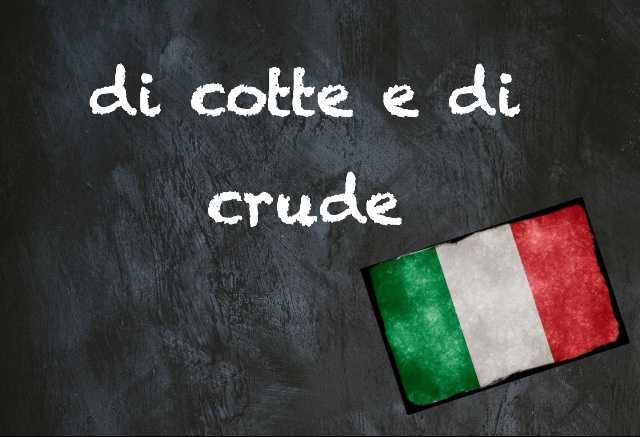Italian expression of the day: ‘Di cotte e di crude’

Here’s why Italians talk about ‘cooked and raw’ things all the time.
It’ll hardly come as a surprise to any of you, but Italians have a very special relationship with food.
As such, many terms and expressions that originated within the confines of Italy’s vast culinary lingo have over time spilled over into other areas of life and are now regularly used to describe situations that have little or nothing to do with cuisine.
That’s certainly the case for ‘di cotte e di crude’ (pronunciation available here).
Now, the expression literally translates into English as ‘[anything] from cooked to raw food’, thus hyperbolically referring to the wide spectrum of dishes a cook could possibly prepare.
But, while its original meaning doesn’t really require any further explanation, what does the idiom mean outside of the cooking world?
Briefly, Italians use ‘di cotte e di crude’ to refer to all sorts of odd, surprising or unexpected things they might have done or experienced while also slyly avoiding going into great detail about them. For instance:
Com’e’ andata ieri sera?
Ah, credimi, ne ho veramente fatte di cotte e di crude.
How did it go last night?
Oh, believe me, I really did all sorts of things.
As you can see from the above examples, ‘di cotte e di crude’ is generally used together with the verb ‘combinare’ (to get up to) or ‘fare’ (to do).
However, verbs such as ‘raccontare’ (to tell), ‘sentire’ (to hear), ‘vedere’ (to see) or ‘passare’ (to live through) can also be used.
Regardless of the verb one chooses to use, it’s worth keeping in mind that the verb must always be preceded by the pronoun particle ‘ne’ (e.g. ne ho fatte, ne ho combinate, ne ho sentite, etc.).
And some native speakers might choose to use ‘di tutti i colori’ (which literally translates into English as ‘[things] of all colours’) instead of ‘di cotte e di crude’.
Ne ho sentite di tutti i colori ultimamente.
I've heard all sorts of things lately.
The two expressions have exactly the same meaning and they require the same grammatical construction (‘ne’ plus verb plus idiom). As such, they’re totally interchangeable.
Do you have an Italian word you’d like us to feature? If so, please email us with your suggestion.
Don't miss any of our Italian words and expressions of the day by downloading our new app (available on Apple and Android) and then selecting the Italian Word of the Day in your Notification options via the User button.
Comments (1)
See Also
It’ll hardly come as a surprise to any of you, but Italians have a very special relationship with food.
As such, many terms and expressions that originated within the confines of Italy’s vast culinary lingo have over time spilled over into other areas of life and are now regularly used to describe situations that have little or nothing to do with cuisine.
That’s certainly the case for ‘di cotte e di crude’ (pronunciation available here).
Now, the expression literally translates into English as ‘[anything] from cooked to raw food’, thus hyperbolically referring to the wide spectrum of dishes a cook could possibly prepare.
But, while its original meaning doesn’t really require any further explanation, what does the idiom mean outside of the cooking world?
Briefly, Italians use ‘di cotte e di crude’ to refer to all sorts of odd, surprising or unexpected things they might have done or experienced while also slyly avoiding going into great detail about them. For instance:
Com’e’ andata ieri sera?
Ah, credimi, ne ho veramente fatte di cotte e di crude.
How did it go last night?
Oh, believe me, I really did all sorts of things.
As you can see from the above examples, ‘di cotte e di crude’ is generally used together with the verb ‘combinare’ (to get up to) or ‘fare’ (to do).
However, verbs such as ‘raccontare’ (to tell), ‘sentire’ (to hear), ‘vedere’ (to see) or ‘passare’ (to live through) can also be used.
Regardless of the verb one chooses to use, it’s worth keeping in mind that the verb must always be preceded by the pronoun particle ‘ne’ (e.g. ne ho fatte, ne ho combinate, ne ho sentite, etc.).
And some native speakers might choose to use ‘di tutti i colori’ (which literally translates into English as ‘[things] of all colours’) instead of ‘di cotte e di crude’.
Ne ho sentite di tutti i colori ultimamente.
I've heard all sorts of things lately.
The two expressions have exactly the same meaning and they require the same grammatical construction (‘ne’ plus verb plus idiom). As such, they’re totally interchangeable.
Do you have an Italian word you’d like us to feature? If so, please email us with your suggestion.
Don't miss any of our Italian words and expressions of the day by downloading our new app (available on Apple and Android) and then selecting the Italian Word of the Day in your Notification options via the User button.

Join the conversation in our comments section below. Share your own views and experience and if you have a question or suggestion for our journalists then email us at [email protected].
Please keep comments civil, constructive and on topic – and make sure to read our terms of use before getting involved.
Please log in here to leave a comment.